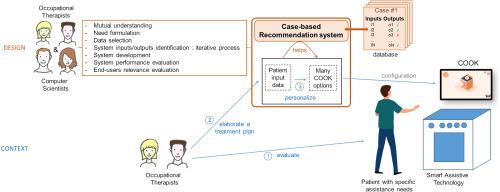Defining a recommendation system to configure personalized assistance for individuals with cognitive impairments due to a traumatic brain injury
IF 5.1
2区 计算机科学
Q1 COMPUTER SCIENCE, CYBERNETICS
International Journal of Human-Computer Studies
Pub Date : 2025-09-22
DOI:10.1016/j.ijhcs.2025.103624
引用次数: 0
Abstract
Smart assistive technologies are increasingly being used to support independent living. Occupational therapists perceive such technologies as useful to helping their clients become more independent in their everyday activities, particularly individuals having sustained a traumatic brain injury. However, adapting and configuring these technologies to meet each person’s individual needs remain challenging. In this study, occupational therapists and computer scientists collaborate to develop a recommendation system designed to assist in configuring a smart assistive technology that helps people having sustained a traumatic brain injury cook safely. The relevance of the recommendations made by this case-based recommendation system was first evaluated by comparing the recommended assistant options with the selections of an expert occupational therapist. Then, we questioned the final users, i.e. occupational therapists, about the usefulness of such a system. This first prototype demonstrated promising results, with about 80% correct recommendations for selection (with an average percentage ranging from 77.0% to 86.2% depending on the threshold set for recommended functionalities, using a database of 16 cases). Additionally, the system was found to be robust against an unbalanced database and has been estimated as useful and relevant by end-users, who remain the final decision-makers. The latter also expressed concerns and suggested improvements, which were incorporated early in the development process to enhance acceptance and facilitate the tool’s integration into clinical practice. As a result, the tools and methods used by the multidisciplinary team led to the successful development of a generic human-centered recommendation system that can be used to personalize smart assistive technologies to each unique person’s needs.

定义一个推荐系统,为因创伤性脑损伤而导致认知障碍的个体配置个性化的帮助
智能辅助技术越来越多地被用于支持独立生活。职业治疗师认为这些技术有助于帮助他们的客户在日常活动中变得更加独立,特别是那些遭受创伤性脑损伤的人。然而,调整和配置这些技术以满足每个人的个人需求仍然具有挑战性。在这项研究中,职业治疗师和计算机科学家合作开发了一个推荐系统,旨在协助配置一种智能辅助技术,帮助遭受创伤性脑损伤的人安全烹饪。这个基于案例的推荐系统提出的建议的相关性首先通过比较推荐的助手选项和专业职业治疗师的选择来评估。然后,我们询问了最终用户,即职业治疗师,关于这种系统的有用性。第一个原型展示了有希望的结果,大约有80%的正确选择建议(平均百分比从77.0%到86.2%不等,取决于推荐功能的阈值设置,使用16个案例的数据库)。此外,该系统被发现对不平衡的数据库具有鲁棒性,并被最终用户(他们仍然是最终决策者)估计为有用和相关。后者也表达了关注并提出了改进建议,这些建议在开发过程的早期被纳入,以提高接受度并促进该工具融入临床实践。因此,多学科团队使用的工具和方法导致了一个通用的以人为中心的推荐系统的成功开发,该系统可用于个性化智能辅助技术,以满足每个人的独特需求。
本文章由计算机程序翻译,如有差异,请以英文原文为准。
求助全文
约1分钟内获得全文
求助全文
来源期刊

International Journal of Human-Computer Studies
工程技术-计算机:控制论
CiteScore
11.50
自引率
5.60%
发文量
108
审稿时长
3 months
期刊介绍:
The International Journal of Human-Computer Studies publishes original research over the whole spectrum of work relevant to the theory and practice of innovative interactive systems. The journal is inherently interdisciplinary, covering research in computing, artificial intelligence, psychology, linguistics, communication, design, engineering, and social organization, which is relevant to the design, analysis, evaluation and application of innovative interactive systems. Papers at the boundaries of these disciplines are especially welcome, as it is our view that interdisciplinary approaches are needed for producing theoretical insights in this complex area and for effective deployment of innovative technologies in concrete user communities.
Research areas relevant to the journal include, but are not limited to:
• Innovative interaction techniques
• Multimodal interaction
• Speech interaction
• Graphic interaction
• Natural language interaction
• Interaction in mobile and embedded systems
• Interface design and evaluation methodologies
• Design and evaluation of innovative interactive systems
• User interface prototyping and management systems
• Ubiquitous computing
• Wearable computers
• Pervasive computing
• Affective computing
• Empirical studies of user behaviour
• Empirical studies of programming and software engineering
• Computer supported cooperative work
• Computer mediated communication
• Virtual reality
• Mixed and augmented Reality
• Intelligent user interfaces
• Presence
...
 求助内容:
求助内容: 应助结果提醒方式:
应助结果提醒方式:


